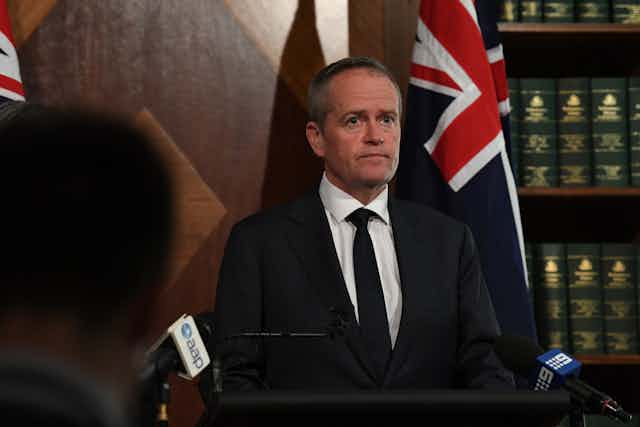Malcolm Turnbull and Bill Shorten are inching toward an agreement on the form of a citizenship declaration that each MP would have to make within weeks.
The two met in Melbourne on Wednesday, with Turnbull hoping they would finalise the declaration. But Shorten, who was accompanied by Labor Senate leader Penny Wong, had two objections to the proposal outlined by Turnbull earlier this week.
Shorten told a news conference later that Labor believed the declaration should outline what steps a person whose parents or grandparents had been born overseas had taken to investigate whether they were a dual citizen. Also, Labor wanted a shorter timeframe for MPs submitting the declaration.
Under Turnbull’s plan, an MP would state the details of where they were born and where their parents were born, and their belief that they were not a dual citizen. The declarations would have to be submitted 21 days after the Senate and the House of Representatives respectively passed a motion approving the new decoration system.
The government plans to move motions for the declaration in the Senate next week and when the House of Representatives meets on November 27.
It emerged on Wednesday that the government was proposing to bring the parliament back in late December to consider the declarations, which would open the way for any MPs who were thought to be dual citizens to be referred to the High Court. But Shorten seized on the point that a special sitting of parliament would be very costly for the taxpayer.
Shorten said the statements should be in by December 1, five days after the lower house resumes, and a week before parliament rises for Christmas.
“This would allow the disclosures to be checked out and then if there are any problems requiring referral to the High Court, that could be done in the last week of parliament,” Shorten said.
On Labor’s proposed tougher test, Shorten said: “Mr Turnbull’s resolution only goes to what the actual individual MP might believe, but I think that we require, and the High Court set, a higher test of us. Labor is not going to support watering down the High Court decisions to help a few MPs scrape back into parliament.”
Late on Wednesday the government and opposition were exchanging proposals for changes to the wording of the motion.
Both Turnbull and Shorten described the talks as “constructive”.
“We are certainly agreed on the need for disclosure of the kind that I’ve set out in the resolution,” Turnbull told a separate news conference.
“We’ve also agreed that the matter must be dealt with before the end of the year.
"By that, I mean that the disclosures should be made before the end of the year and the House and the Senate should have the opportunity, having considered those disclosures, whether any members or senators should be referred to the High Court … of course it may be that nobody needs to be referred to the High Court.”
Meanwhile, Liberal backbencher John Alexander, the member for Bennelong, is waiting for British Home Office advice on whether he is a dual British citizen. The issue revolves around whether Alexander’s father, who was born in Britain, renounced his citizenship – as Alexander believed.
If Alexander turns out to be ineligible to sit in parliament the government would face a byelection in a seat it would be vulnerable to losing.
The government is homing in on Labor MP Justine Keay, from Tasmania, who moved to renounce her UK citizenship before she nominated but did not receive confirmation until after the election. Labor insists that Keay met the requirement to make every reasonable effort to renounce a foreign citizenship.
Issues are being raised about several other MPs. The crisis has already claimed half-a-dozen victims.
Postscript
Four Liberal senators including a minister have nominated for Senate president – but the Nationals New South Wales senator John “Wacka” Williams has said he will not contest. Special Minister of State Scott Ryan has nominated to be the government’s candidate, as have David Fawcett, Dean Smith and Ian Macdonald. If Ryan were successful that would open up a vacancy in the outer ministry.
The government’s candidate will be chosen before the Senate meets on Monday.
Tasmanian Greens senator Peter Whish-Wilson will contest the position against the government candidate but has no hope of success.
The Nationals have never held the position. Williams’ bid was seen as part of the tensions between the Coalition partners in the wake of the citizenship crisis which has claimed two Nationals ministers, forcing Deputy Prime Minister Barnaby Joyce to a byelection and ending – at least for the foreseeable future – the political career of Fiona Nash.

